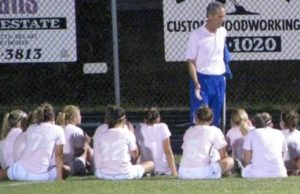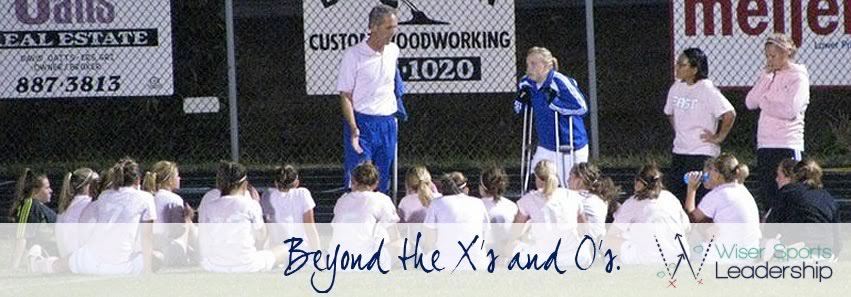May 28, 2017 ·
DeAngelo Wiser
·
Uncategorized
DeAngelo Wiser
Have you ever been caught off guard by a parent questioning your ability or skill to coach? Odds are at some point in your career, to some degree, it will happen. It may be subtle hints or even an angry conversation.
How will you react? Defensively? Angrily? Surprised? All are natural reactions to someone ultimately attacking your character and or ability. At least that’s the way you may see it. Is there another view?
 Playing time and awards are the number one challenges you’ll face with parents. “Why isn’t my child playing or playing more?” and “How could my child not have been the MVP or been omitted from that all tournament team?” will always be questions you may have to deal with.
Playing time and awards are the number one challenges you’ll face with parents. “Why isn’t my child playing or playing more?” and “How could my child not have been the MVP or been omitted from that all tournament team?” will always be questions you may have to deal with.
As a coach you may be surprised when it’s after a big win or after a season when your team was very successful. Keep in mind it’s a challenge that is blind to winning or losing. Your team could be 20-0 or 0-20 when this situation presents itself.
For those of you who’ve experienced a confrontation of this nature, when all the dust settled and you had time to think about the situation, were you in the wrong? Did you make a bad decision? Did it have a more far-reaching impact than you intended? Were you hoping it would go away on its own? Should you have addressed it, but didn’t?
Initially it’s tough to absorb, especially when you pour your heart and soul into your team day after day. How could anyone think that you weren’t capable of or dealing conscientiously with the challenges of coaching?
The first step is to see it from their perspective. Not from a “I’ll prove you wrong” attitude, but from a “Let me replay and think about the situation” and what really happened.
Many coaches refuse to talk about playing time with parents and have guidelines that state the same. Will that deter a parent who sits with other parents of players who play the entire game and cheer their kids on? Doubtful.
As a game progresses they become more and more upset, and often will seek you out after the game. Initially you may want to be brutally honest concerning the ability of their son or daughter highlighting all the skills they’re lacking or their sub-par athleticism. But, of course, that is not the right approach. Parents will always see their sons or daughters in a positive light and think they are the best player on your team. Nothing you say in a negative way will ever change that. While you may want to win this battle it isn’t necessary. Stay composed and positive, focus on the attributes this player has and why you kept them on the team.
Should there be ground rules for meetings concerning these situations?
Develop your own expectations for meeting with parents.
1. 24 hour “cooling off” rule for meeting
2. Call for an appointment, no email or social media.
3. No mention of any other players at the meeting.
4. Meetings will include Athletic Director
Explain and hand these out to all parents at the first meeting before the season begins. Let them know your philosophy with respect to starting, playing time, practicing, awards, etc. It won’t make you immune to a confrontation, but it will help knowing you did it.
In the end your best course of action will be to simply listen to everything the parent has to say. Refrain from countering every point they make and wait until they finish before you speak. You’ll have time at the end to state your points. Listening will give you great insight to their perspective, and ultimately let them get rid of what’s bothering them so much. They may even say as one of my parents said, “We know Billy isn’t the best player in the world, but if you could just find a way to get him in a game or two we would be thankful.”
Always keep in mind a child is the most important piece of a parent’s life.
I wish you and your team the best!
May 2, 2017 ·
DeAngelo Wiser
·
Uncategorized
DeAngelo Wiser
 Have you encountered a player or players you couldn’t reach over the course of a season? They always looked at you skeptically with locked out body language when you addressed the team, and didn’t appear to trust you or anyone else. Where does that originate? Is it essential that it should change? At that point is their attitude detrimental to the team?
Have you encountered a player or players you couldn’t reach over the course of a season? They always looked at you skeptically with locked out body language when you addressed the team, and didn’t appear to trust you or anyone else. Where does that originate? Is it essential that it should change? At that point is their attitude detrimental to the team?
We all understand that attitudes are shaped and based on life experiences, either through our family or situations with others. Often those experiences aren’t very pleasant and thus a mistrustful attitude is born. Plus, many parents teach their children to be skeptical of everyone they meet as a safeguard. I think you’d agree that’s a good approach in today’s society. The question is, should it last a lifetime with everyone our player meets? Can it be changed or altered if necessary?
Should we always be obsessed with changing the attitudes of our players to our way of thinking? I think not.
Give thought to your personality and level of trust. Can it be a benefit to have players with the opposite perspective? Without a doubt! Just by disagreeing they cause us to often rethink the activity, strategy and ways to get through to our players. The key is teaching our players not to necessarily change their attitude, but to deal with situations in a respectful and “let’s see manner.”
What is a “let’s see manner?” Its players waiting to see how something plays out, the benefit it may have for them and that maybe it might just be a good thing. All we’re doing is asking them to change the lens they look through and be a little more flexible. Every time they are, it builds trust and over the course of time shifts the outlook from, “I hate doing this,” to “Wow! This isn’t bad,” and “I had no idea this would help me and the team so much.”
Attitudes, unlike skills, can take a long time to adjust, and very often you may never see it. Doesn’t mean you stop trying. Takes a lot of patience, and at times tolerance, to work through the lessons of a tolerant and accepting attitude.
How can you get started?
Meet with the player(s). Let them know you sense some skepticism. Ask for their feedback and see if they will share where it originates.
Let them know what kind of coach you are, and what you expect from every player.
Ask how they think attitude and outlook impacts a player and the team.
Share your ideas on how players should address areas they don’t agree with.
Ask their thoughts.
Explain that your door is always open should they want to discuss anything.
Avoid giving this player very special treatment because you feel especially bad for past experiences in their life.
Be consistent with your words and actions. All players must be held accountable in practice and games. These individuals are especially sensitive to inconsistency or favoritism.
Remember to call on them, as well as other players, from time to time with thoughts about what they accomplished in practice to end the day.
Pair them up, or put them in a strong leadership group that can help with any issues they may be having.
We often shy away from allowing this type of player an opportunity to speak in front of the team, unsure of what they might say. How about calling on them and showing we have confidence and value their opinion as much as anyone on the team.
You may want to put them in a leadership role (as well as other players) for a day to see what it’s like. They may gain an appreciation for what you do, and see firsthand that it’s not easy taking care of so many players and viewpoints.
Another reason behind the skeptical attitude may be boredom. They may not see the justification or reasoning for many repetitions of a particular skill or play. Explaining the “why” and how it will help them and the team may be all they need.
Just because they’re skeptical in the beginning doesn’t mean they need to be their whole career. Keep working to break down that barrier, it will be worth it.
I wish you and your team the best.
April 2, 2017 ·
DeAngelo Wiser
·
Uncategorized
DeAngelo Wiser
Players face many challenges throughout their careers, but none are greater than the questions that race through their minds creating doubt and anxiety. How can they deal with it all? Should they avoid them, push them back, only to face them another day?
Often the questions listed below can keep a player from achieving their dream and realizing how good they can become. There will always be questions along the way. Some remind players to get back on track, while others place doubt in their minds over their dedication, ability, and determination.
Let’s take a look at some of the questions and advice a coach could share with their players:
WHY DO I PLAY? After a tough practice, preseason conditioning, injury or a heartbreaking loss, it’s natural to ask why you play the game. Why subject yourself to such punishment and despair? Is it worth it? Take a moment and visit those special memories you created with teammates and the positive moments shared along the way. It only takes a few to let you know why you play.
DO I HAVE WHAT IT TAKES? As you progress from high school to college you may find out quickly that your skill is matched or below your teammates and opponents. Are you as good as you can be? Have you honestly pushed yourself? Probably not yet, so just be determined to improve every day. It won’t be easy, but it will be worth it. You know the answer, but are you really willing?
IF NOT TODAY WHEN? It’s easy to put things off until tomorrow. Champions refuse to do that. They understand that today is a gift for learning and improving. Tomorrow will have its own set of challenges to face. Don’t let yourself off the hook today by putting something off that should be worked on today. Look it in the eye, accomplish it and move on, you’ll be glad you did.
HAVE EXCUSES BECOME PART OF MY DAY? Have you ever caught yourself telling a teammate or coach you just didn’t feel good when in actuality there was nothing wrong? How about with an activity or skill that you didn’t feel comfortable with? Putting yourself in new game situations on the practice field that make you uncomfortable allows you to grow. Did you make an excuse to avoid it? Once you get started on an excuse path it gets easier and easier. Stay disciplined, avoid excuses and embrace tough situations.
CAN I LOOK IN THE MIRROR? At the end of the day, can you stand in front of the mirror and be proud of your efforts? It has nothing to do with winning and losing. It has everything to do with you giving an honest effort for yourself and your teammates. Only you can give a true assessment of your dedication and determination. One person we can never fool is ourselves.
WHAT IF I MAKE A MISTAKE? Mistakes are part of any game. By dwelling on this question and worrying about who’s watching, you highlight it and make it bigger than it is. If it’s the only thing you think of during a game, guess what? Mistakes will come your way. Great players make mistakes, but what they see is the reward and what can be accomplished beyond the mistakes. Focus on what you can control, your effort, not mistakes.
WHO CAN I TURN TO? Without someone to share your thoughts and feelings with, they suddenly consume every thought you have. Find a teammate or friend who will take the time to listen. They may not have any answers, and that’s okay. Just by sharing them you’ll be able to release some of the added pressure you were feeling. Great friends never quickly judge and understand you may not be seeking solutions.
CAN I MAKE AN IMPACT ON THIS TEAM? You may have another view of your role or what it could be on the team. When you’ve experienced success easily in high school and now not so much in college, doubt starts to build. Remember, you were recruited for a reason and mainly because of your ability or potential. It’s time to live up to that potential. Change your mindset and work on your game with passion and enthusiasm. Only you can decide whether the drive to improve is worth the effort required. Your teammates are counting on you.
HOW CAN I AVOID DOUBT/FEAR/ANXIETY? You may not be able to totally, but you can certainly reduce it. Envision yourself in shining moments where you make the perfect pass, big save, game winning goal, etc. Draw from all the successes in your career. When your image and focus are more on what you’ve accomplished and who and what you can become, doubt, fear and anxiety become smaller and smaller. Eventually those thoughts and questions will fade away.
HOW DO I GET BACK THE PASSION I HAD AS A LITTLE KID? No reason you can’t, but understand you’ve grown into a new person and player. Everyone thinks back to those days when we ran around the field freely with a love for the game. It brought us to where we are today. Keep those memories close and remember you have new responsibilities for yourself and your teammates, which can bring even greater rewards. Go ahead and embrace the game the way you did back then. It’s up to you.
Questions allow you to grow. They are your conscience asking, “Are you where you want to be, doing what you love, giving all you have, and being the person and player you are capable of?” The challenge is to not dwell on the questions, but to answer them and move past. You will always be the only one who knows if you answered them truthfully. When you do, it frees you up to play again with the passion you did as a kid.
I wish you the best!!
 Playing time and awards are the number one challenges you’ll face with parents. “Why isn’t my child playing or playing more?” and “How could my child not have been the MVP or been omitted from that all tournament team?” will always be questions you may have to deal with.
Playing time and awards are the number one challenges you’ll face with parents. “Why isn’t my child playing or playing more?” and “How could my child not have been the MVP or been omitted from that all tournament team?” will always be questions you may have to deal with.

 Have you encountered a player or players you couldn’t reach over the course of a season? They always looked at you skeptically with locked out body language when you addressed the team, and didn’t appear to trust you or anyone else. Where does that originate? Is it essential that it should change? At that point is their attitude detrimental to the team?
Have you encountered a player or players you couldn’t reach over the course of a season? They always looked at you skeptically with locked out body language when you addressed the team, and didn’t appear to trust you or anyone else. Where does that originate? Is it essential that it should change? At that point is their attitude detrimental to the team?